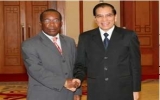Manpower export: long-term vision a need
Gyorgy Sziraczki, the International Labour Organisation’s senior economist, told Tuoi Tre that Vietnam should not be dependent on migrant workers and need to have a long-term vision in labour export.
The ILO economist confirmed that Southeast Asia has surprised the world in its pace of economic recovery. He said:
ASEAN economies are resuming very strongly, especially in Thailand, Singapore and Malaysia. This is very impressive because six months ago, nobody had that hope. Now it is important to maintain that growth and withdraw economic stimulus packages.
Another interesting point is that Southeast Asia doesn’t suffer from large-scale unemployment. Non-official jobs have increased strongly after the crisis, with over 60 percent in the region being non-official jobs. It means that many workers don’t enjoy social welfare.
Notably, the recent world economic crisis didn’t hit the poor the most, but rather those who have just escaped from poverty thanks to fast economic growth rate and who work at industrial and export processing zones. The recent crisis suddenly made many people become jobless and they felt into poverty again.
Labour productivity is another surprise in Southeast Asia. Singapore and Malaysia face serious problems in labour productivity reduction. Vietnam still maintains rising labour productivity, but it is still low in comparison with India and China.
Vietnam sent 29,000 workers overseas to take up a variety of occupations in the first five months of this year, an increase of 5 percent over the same period last year.
Taiwan topped the list of markets that hire Vietnamese workers, closely followed by the United Arab Emirates, Laos, Japan and Malaysia.
The country now expects to realise its target of exporting 85,000 workers this year.
To maintain the labour export market, MoLISA has continued with supportive programmes for workers who will go overseas, including courses that hone workers’ skills and training on customs, familiar practices and the laws in host countries.
The MoLISA also now offers more training courses on welding, construction, mechanic engineering, tourism and hotel services as the importing markets all have a high demand for these occupations.
Vietnamnet



